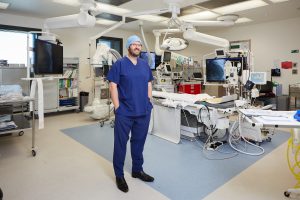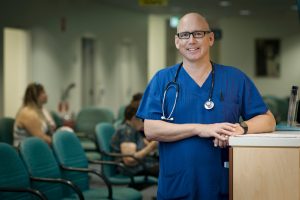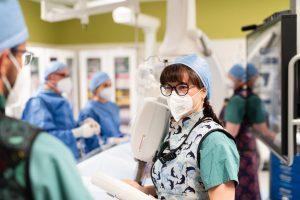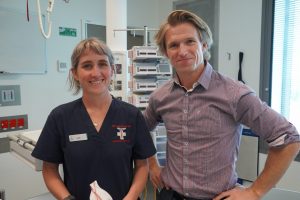 The Central Adelaide Local Health Network (CALHN) is the major provider of specialty health services to residents of the APY Lands, providing respiratory, renal, endocrine and cardiology outreach services to the community, in addition to the delivering healthcare to residents when in Adelaide at our various sites.
The Central Adelaide Local Health Network (CALHN) is the major provider of specialty health services to residents of the APY Lands, providing respiratory, renal, endocrine and cardiology outreach services to the community, in addition to the delivering healthcare to residents when in Adelaide at our various sites.
Last month, CALHN supported a SA Health deployment to the APY Lands region after traces of COVID-19 was detected in wastewater testing.
CALHN’s existing relationships enabled and facilitated a very rapid and easy community engagement largely sustained through our ongoing effort delivered over many years.
By Head of Cardiology, Associate Professor Chris Zeitz
“The Central Adelaide Local Health Network’s deployment to the APY lands was initiated on Sunday, 12 December after consecutive wastewater tests for the Indulkana community showed positive results for COVID-19. This raised the possibility that there were active cases in the community, even though none had yet been detected.
Leveraging previous planning and extensive community engagement that had been undertaken in preparation for this situation to determine how SA Health could best support the community should such an event occur. While most of the planning had been centred around a positive COVID case being detected in the community, on this occasion there was suspicion of a case rather than a definite case. Therefore, the main priority of the deployment was to test as many in the community as possible to confirm if there were active cases of COVID-19.
A team of approximately 20 people were progressively deployed over the next 24 hours with some travelling to Coober Pedy Sunday afternoon, then driving to Marla on Monday and the remainder flying to Marla at first light Monday morning.
The team consisted of logistic support, SAAS operational staff, SA Pathology and SA Health staff, RFDS flight nurses and CALHN staff, to support activities on the ground.
At a meeting of the Indulkana community on late Monday morning, we were asked to support the testing of all residents for COVID. The team then travelled to Indulkana by road (as there is no airstrip in Indulkana) and over the course of Monday afternoon and Tuesday, were able to swab virtually every member of the community, including a number of children.
The swabs were flown to Adelaide each night for processing and results were available the following morning. There was a very positive experience with the community being very welcoming and appreciative of the presence of staff.
We were able to support the local health service to continue delivering their usual services without our presence impacting on this to any degree. The CALHN staff stayed in Indulkana on Monday and Tuesday night to facilitate ongoing activities on the ground. We were even able to catch up with some of the CALHN cardiac patients while we were there and see how they were progressing.
In addition to testing for the presence of COVID, the opportunity was also taken to vaccinate any individuals who were eligible. Importantly, there had been significant efforts to get the community vaccinated, with more than 80 per cent of APY residents double vaccinated already and more than 90 per cent of the Pipalyatjara community double vaccinated. Nearly 100 additional vaccine doses were administered by the team whilst we were there.
By Wednesday morning, we had established that there were no active cases of COVID in the Indulkana community. By this time, COVID had also been detected in consecutive wastewater samples from the Pipalyatjara community, near the NT/WA/SA border. Heavy rain on Wednesday prevented the team from flying in but, following a community meeting on Wednesday, and with no further rain, the team was able to fly in early Thursday morning and again test virtually the entire community for COVID. Again, no active cases were detected.
By Thursday night, it was becoming apparent that a feared outbreak in the lands had not occurred and the team was progressively repatriated to Adelaide over the next few days.
Whilst no active cases of COVID were detected on this occasion, the exercise was useful, particularly as it demonstrated a strong partnership between the community and the attending staff, with both groups being very pleased with the positive interaction. It certainly helped when, after Christmas, positive cases of COVID ultimately did appear in the community and teams could respond rapidly to assist.”
Read more about CALHN’s COVID-19 response here.



